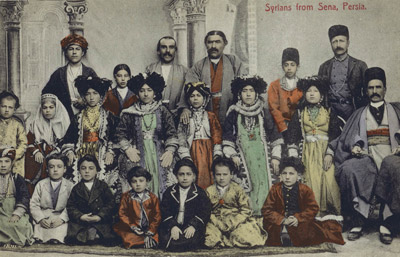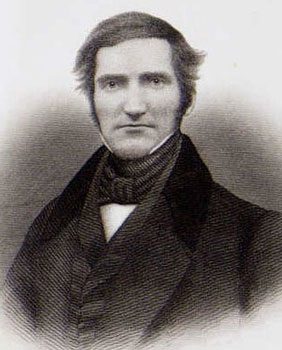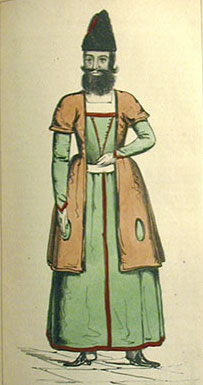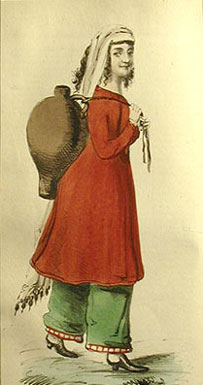|
 Assyro-Chaldeans in traditional costumes - Persian Sanandaj around 1900
The Assyrian minority in Persian Azerbaijan, nowadays NW Iran, lived in villages along the western shore of Lake Urmia, close to the border with Ottoman Turkey. These Nestorian Christians of the plain were a rather thriving community with their own clergy and dioceses. They were engaged in trade and agriculture, growing crops and fruit, and they had a relatively quiet life. Quite different from the violent feuds that all too often ravaged the terraced hamlets of the Assyrian tribes in the mountains of Hakkari on the Turkish side of the border.
Urmia was the main town of the region. To the south of Lake Urmia, deeper in the Kurdish highlands of Persia, there was another Christian diocese around the town of Sena, nowadays known as Sanandaj. This Assyrian community, mainly Chaldean Christians, spoke an Aramaic dialect that was quite different from the Neo-Aramaic Sureth of the Urmia Assyrians.
At the end of the First World War disaster fell upon the Persian Christians. Together with the Assyrian mountaineers, who had fled from Hakkari in 1915 and had settled down as refugees in Persian Azerbaijan, the Assyrian population of the plain had to leave Urmia. Attacked by Turkish army units and by Kurdish and Persian irregulars, the whole Assyrian nation, men, women and children, started the terrible exodus that made thousands of victims and finally brought them under the portection of the Britsh army. Later on a part of the Persian Nestorians returned to the Urmia region. But it was never like before. World war I marked the end of an era, it caused the ruin of that prosperous Nestorian community on the plain at Lake Urmia.
 Asahel Grant (1807-1844) - American missionary in Urmia and Hakkari
In the middle of the nineteenth century western missionaries came to the Urmia region. They had heard about the Nestorian Christians and wanted to convert them to a better faith in Christ. American Protestants, Presbyterians, led the way and they founded the American mission at Urmia in 1835. Asahel Grant, a doctor and a zealous Presbyterian from New York, was the first to undertake the dangerous voyage through the Hakkari mountains in search of the Assyrian tribes. He met their Nestorian patriarch Mar Shimun and as a competent hakim or physician he became friends with the patriarch.
 Assyrian priest - Perkins 1843  Assyrian woman - Perkins 1843
Grant's colleague, Justin Perkins, was more the type of a real scholar and linguist. He translated the Bible into Neo-Aramaic Sureth, the language spoken by the Assyrians of the Urmia plain. That Bible translation was printed on the printing press that the American missionaries had brought to Urmia. Justin Perkins also devoted himself to more popular research about the culture and traditions of the Urmia Nestorians. This resulted in colourful pictures of Assyrian traditional costumes in his work Residence of Eight Years in Persia among the Nestorian Christians (1843).
Grant and Perkins were pioneers in Persian Azerbaijan. The American mission had another compound with seminary and hospital built on Mount Seir, south of Urmia. That hilltop retreat was a somewhat better place. The Urmia climate was hard to bear, especially in summer, and malaria was a real plague. But all would turn out well according to Grant, since God would take care of His children.
It is all history now. The American mission in Urmia belongs to the past. The only site that remains there till today is the American graveyard on Mount Seir. There are sixty graves and about forty of them are graves for small children. They were the American missionaries' children who didn't survive the climate and the other hardships on the Urmia plain. God reigns, Grant wrote in his letters to the Presbyterian Church in the USA, and the time is ripe for the harvest of souls. He meant the souls of the Assyrian Nestorians. It turned out otherwise.
Text - A Thiry
|

 Homeland
Homeland  Iran
Iran  Urmia souls
Urmia souls

 Homeland
Homeland  Iran
Iran  Urmia souls
Urmia souls